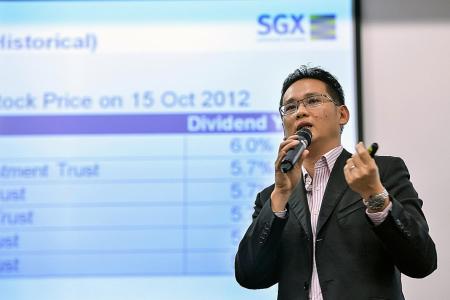STI investors may have reasons to cheer
It's earnings-reporting season for some of Singapore's biggest names
Earnings-reporting season is ongoing for some of Singapore's biggest names.
Yesterday, StarHub, Breadtalk Group and Sembcorp Industries announced their first quarter earnings.
Investors should also be excited, because several firms will also be distributing dividends around the same period.
Yesterday was the ex-dividend date of at least 24 companies, including several well-known names such as transport company ComfortDelGro and United Overseas Bank.
And those with a stake in a Straits Times Index (STI) company may have reasons to cheer.
The STI - which represents the 30 biggest and most active stocks listed on Singapore Exchange (SGX) - has generated a price gain of 9 per cent in the year to date.
Taking dividends into account, that return will be boosted to 9.5 per cent, according to an SGX market update on April 24.
The STI's performance has been promising compared to the region - South-east Asia saw dividend-inclusive returns of 6.8 per cent, while the broader Asia-Pacific saw 5.8 per cent returns.
This has coincided with global capital rotating from emerging markets (such as China, India, Indonesia and Malaysia) to developed markets (such as Australia, Hong Kong, Singapore and Japan).
Another key trend is investment moving into more cyclical sectors, which are more sensitive to economic forces.
For instance, the five best performers within the Index over the period were Yangzijiang Shipbuilding Holdings, Global Logistic Properties, City Developments, UOL Group and CapitaLand, according to an SGX report in April. Four of these five stocks represent the real estate sector, specifically real estate managers and developers.
As a market correction might be impending, the earnings reporting season is a good time for investors to re-evaluate the stocks of companies they own, said Mr Chua I-Min, who was a coach for an SGX webinar last week on how an investor can construct a portfolio.
Mr Chua told The New Paper that investors should also look at the future prospects of a company.
"Retail investors should look out for a company's growth by looking at the net income and profits. They should also take note of whether the growth is just a one-off situation, or if it is sustainable," he added.
An April 17 SGX report said most investors diversify their stock portfolios.
"This can be over the different sectors that stocks operate in, the countries where stocks generate their revenue or base their assets, in addition to the different 'style' of stocks.
"By style, investors can be referring to the size and volatility of a stock, in addition to potential value stocks, growth stocks, high dividend stocks or quality stocks."
Quality stocks are judged according to the "quality" of their financial reports, including operating statements, balance sheets and cash flow statements.
The SGX report also said it is important to set a benchmark when creating a portfolio; investors with a portfolio of Singapore stocks will often use the STI as their guide.
This is because performance can be relative, said the report.
"For example, an investor's portfolio may have generated a seemingly substantial annual return of 10 per cent, yet the most relevant benchmark achieved an annual return of 20 per cent over the same period.
"In this case, the 10 per cent may actually have been less than optimal."
Investors should also note that the composition of the STI is reviewed every quarter to reflect economic trends and business cycles. There are up to five STI Reserve List stocks, which will be used when a constituent of the STI is removed during the period leading up to the next quarterly review.
The STI Reserve list is now made up of Suntec Reit (real estate investment trust), Mapletree Commercial Trust, Keppel Reit, Sembcorp Marine and First Resources.
Since the start of 2010, the STI has seen 11 new inclusions, said an SGX report on April 28.
Of the 11 stocks, nine are still part of the STI - with one of the nine stocks, Jardine Matheson Holdings, a re-entrant and currently the biggest company on the SGX by market cap. (See chart, above.)
Investors who do not have time to research individual companies on the STI still have options. The STI has two related exchange-traded funds (ETFs) - the SPDR Straits Times Index ETF and the Nikko AM Singapore STI ETF.
The SGX report noted that the SPDR Straits Times Index ETF was the third most active ETF last month. It generated $24 million of turnover, and registered total returns of 10.4 per cent and 13.9 per cent in the year-to-date and 12 months respectively.
ETFs are investment funds listed and traded intraday on a stock exchange. Most ETFs aim to track the performance of an index, and in this case they track the STI.
Each ETF gives investors access to the performance of the asset that comprises the underlying index. Investing in the ETF is also less costly if one builds a similar portfolio by buying the individual stocks.
"By maintaining a position in either of the two STI ETFs, investors will have portfolio exposure to the 30 biggest and most active STI stocks as they change over time," noted SGX.

About SGX webinars
The Singapore Exchange (SGX) introduced the Investment Webinar Seminars last September, targeting trading representatives.
After gaining traction, the online seminar was extended to retail investors in January this year.
It is meant to be interactive, and includes a question and answer session with the trainers, allowing investors to clear any doubts on the spot.
To date, more than 700 retail investors and trading representatives have logged on to these investment webinars, covering a range of topics.
They include basic information such as how to use SGX StockFacts, which provides information about companies on the local bourse, as well as understanding and making use of SGX's institutional fund flow and other market reports.
Investors were also given tips on consumer and Reits sector picks, as well as portfolio allocation.
To find out more, visit www.sgx.com/academy
Get The New Paper on your phone with the free TNP app. Download from the Apple App Store or Google Play Store now


